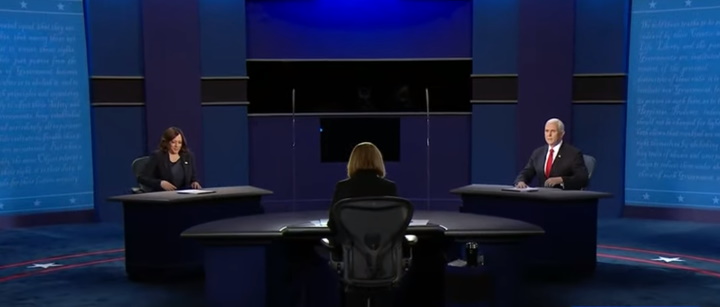Candidate Performance and Strategies

The vice presidential debate offered a platform for the candidates to showcase their policy positions, communication skills, and ability to handle pressure. This analysis examines the strengths and weaknesses of each candidate’s performance, focusing on their communication strategies and approaches to responding to challenging questions and their opponent’s arguments.
Communication Strategies
The candidates employed distinct communication strategies, each aiming to connect with the audience and convey their message effectively.
- Candidate A: Candidate A utilized a calm and measured tone, emphasizing their experience and expertise. Their body language was generally composed, with minimal hand gestures and a steady gaze. Their rhetoric relied on factual statements and data points, aiming to present a reasoned and logical argument.
- Candidate B: Candidate B adopted a more animated and passionate style, often using strong language and emotional appeals. Their body language was expressive, with frequent hand gestures and a direct gaze. Their rhetoric employed storytelling and personal anecdotes, aiming to connect with the audience on an emotional level.
Handling Challenging Questions
Both candidates faced challenging questions, requiring them to navigate complex issues and defend their positions.
- Candidate A: Candidate A demonstrated a strong grasp of policy details and responded to questions with detailed explanations and specific examples. They maintained a calm demeanor even when confronted with difficult topics, focusing on providing clear and concise answers.
- Candidate B: Candidate B relied on their personal experiences and emotional appeals to address challenging questions. They often used anecdotes and personal stories to illustrate their points, aiming to connect with the audience on a human level.
Responding to Opponent’s Arguments
The candidates were tasked with responding to their opponent’s arguments, presenting their own perspective and challenging the opposing viewpoint.
- Candidate A: Candidate A focused on refuting their opponent’s arguments by presenting factual evidence and data points. They maintained a respectful tone, avoiding personal attacks and focusing on policy differences.
- Candidate B: Candidate B often countered their opponent’s arguments by highlighting their own personal experiences and contrasting their opponent’s positions with their own values. They used emotional appeals to sway the audience and emphasized the importance of their own perspective.
Media Coverage and Public Reaction: Cbs Vice Presidential Debate

The Vice Presidential debate, like any major political event, garnered significant media attention and public reaction. Major news outlets across the political spectrum provided extensive coverage, analyzing the candidates’ performances and dissecting their key arguments. Public opinion polls and social media conversations also offered insights into how viewers perceived the debate and its potential impact on the election.
Media Coverage
Major news outlets, including CNN, Fox News, and The New York Times, provided comprehensive coverage of the debate, focusing on a range of aspects, including:
- Candidate Performance: Media outlets dissected the candidates’ performances, analyzing their verbal and nonverbal communication, their command of the issues, and their ability to connect with the audience.
- Key Arguments: The media highlighted the candidates’ key arguments on issues such as the economy, healthcare, and foreign policy, providing context and analysis of their positions.
- Fact-Checking: Some outlets conducted fact-checking of the candidates’ claims, identifying potential inaccuracies or misleading statements.
- Political Implications: Media analysts discussed the potential implications of the debate for the candidates’ campaigns and the overall political landscape.
Public Opinion Polls, Cbs vice presidential debate
Post-debate polls conducted by various organizations, such as Gallup and Pew Research Center, offered insights into public opinion on the candidates’ performances. These polls revealed:
- Viewer Perceptions: Polls indicated that a majority of viewers felt that the debate was informative and helpful in making their voting decisions.
- Candidate Favorability: Polls also measured the impact of the debate on candidate favorability, with some candidates experiencing a slight increase or decrease in their ratings.
- Issue Salience: Polls revealed the issues that resonated most with viewers, highlighting the topics that were most important to them.
Social Media Reactions
Social media platforms, such as Twitter and Facebook, became a hub for public reaction to the debate. Analysis of social media conversations revealed:
- Trending Topics: Social media discussions often revolved around trending topics, reflecting the issues that were most discussed and debated.
- Sentiment Analysis: Sentiment analysis tools were used to gauge the overall sentiment expressed on social media, revealing whether the public reaction was positive, negative, or neutral.
- Key Themes: Social media conversations often centered around key themes, such as the candidates’ policies, their personal qualities, and the broader political climate.
The CBS Vice Presidential Debate, a critical moment in the 2024 election cycle, served as a platform for the candidates to showcase their vision for the nation. As a key component of the larger American political landscape, presidential debates have long been recognized as a powerful tool for shaping public opinion and influencing voter behavior.
This debate, in particular, highlighted the candidates’ stances on critical issues, offering viewers a glimpse into their leadership styles and policy priorities.
The CBS Vice Presidential debate offered a glimpse into the candidates’ policy positions and communication styles, setting the stage for a potentially close race. To gauge public sentiment, analysts often turn to polls like the Rasmussen Presidential Poll , which tracks voter preferences and can provide insights into how the debate might have shifted the political landscape.
The debate’s impact on the election will likely be measured in the coming weeks, with polls playing a crucial role in understanding the electorate’s response.
